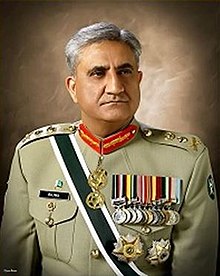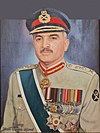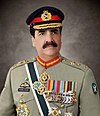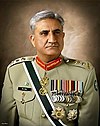Chief of Army Staff (Pakistan)
| Chief of the Army Staff | |
|---|---|
| سالارِ افواجِ پاکستان | |
 Flag of the Chief of the Army Staff | |
| Ministry of Defence Army Secretariat-I at MoD[1] | |
| Abbreviation | COAS |
| Member of | Joint Chiefs of Staff Committee |
| Reports to | Prime Minister Minister of Defence |
| Seat | General Headquarters (GHQ) Rawalpindi Cantonment, Punjab |
| Nominator | Prime Minister |
| Appointer | President |
| Term length | 3 years Renewable once |
| Precursor | Commander-in-Chief of the Army |
| Formation | 3 March 1972 |
| First holder | General Tikka Khan |
| Unofficial names | Army Chief |
| Deputy | Vice chief of Army Staff (abolished) Chief of General Staff |
| Salary | According to Pakistan Military officer's Pay Grade(apex Scale) |
| Website | Official website |
The Chief of Army Staff (Urdu: سالارِ افواجِ برّیِ پاکستان) (reporting name: COAS), is the most senior officer in the Pakistan Army.[2]
This is the senior most appointment in the Pakistan Armed Forces who is a member of the Joint Chiefs of Staff Committee in a separate capacity, usually consulting with the Chairman joint chiefs to act as a military adviser to the Prime Minister and its civilian government in the line of defending the land borders of the country.[3] The Chief of Army Staff exercise its responsibility of command and control of the operational, combatant, logistics, and training commands within the army, in contrast to the Chief of Staff of the U.S. Army.[3] Due to its stature, the Chief of Army Staff have been instrumental in enforcing martial laws against the civilian government due to the meltdown of a civil-military relations in the past decades.: 168 [4][5]
The appointment, in principle, is constitutionally subjected to be for three years but extension may be granted from the approval and recommendations of the Prime Minister by the President.[6] The Chief of Army Staff is based in the Army GHQ, and the current Chief of Army Staff is General Qamar Javed Bajwa, serving in this capacity since 29 November 2016[7][8][9]
Office of the Chief of the Army Staff[]
The designation of the Chief of the Army Staff was created from the previous title Commander-in-Chief of the Pakistan Army in 1972. Since 1972, there has been 10 four-star rank army generals to be appointed as chief of army staff by statute.[10] The Prime Minister approved the nomination and appointment of the Chief of Army Staff, with President confirming the Prime Minister's appointed choosing and nomination.[11]
The chief of army staff has been instrumental in instigating and enforcing the coups d'état against the civilian government and the Prime Minister.: 40 [12][13] In 1977, General Zia-ul-Haq was the first army chief who carefully planned a coup against Prime Minister Zulfikar Ali Bhutto when the right wing opposition instigated popular demonstration after the general elections held in 1977.[14]
After the Pakistan Army's performance in Kargil sector, Prime Minister Sharif terminated the commission of General Musharraf, as an army chief and chairman joint chiefs, but Musharraf refused to follow the orders by instigating and leading the military coup by turning over the government under his control on 12 October 1999.[15][16]
The army chiefs, including the previous army's commanders-in-chiefs, had justified their course of actions by noting to attempt to control the worsening of the law and order situation in the country, as in the case of Yahya Khan (1969): 239 [17] and General Zia-ul-Haq: 239 [17] (1977), or by attempting to revive the economic prosperity in a threat of financial crises, as seen in the case of General Ayub Khan (1958): contents [18][19] and General Pervez Musharraf (1999).: 154 [20]: 254 [21]
The army leadership is based in the Army GHQ whose functions are supervised by the Chief of Army Staff, assisted by the civilians from the Army Secretariat of the Ministry of Defence (MoD).[1] The Chief of Army Staff exercise its responsibility of complete operational, training and logistics commands.: 131 [4][self-published source?]
There are several principle staff officers (PSO) that assists in running the operations of the Army GHQ:
- Engineer-in-Chief (Eng-in-C)
- Chief of General Staff
- Chief of Logistics Staff
- Inspector-General of Training and Evaluation (IGT&E)
- Inspector-General Communications and IT (IGC&IT)
- Inspector-General Arms (IG Arms)
- Military Secretary (Mil Secy)
- Adjutant-General
- Quartermaster General (QMG)
- Master-General of Ordnance (MGO)
- Judge Advocate General Corps
- Director-General EME (DGEME)
- Director-General Frontier Works Organisation (DGFWO)
- DG Combat Development Directorate
List of Chiefs of Army Staff[]
| No. | Portrait | Chief of Army Staff | Took office | Left office | Time in office | Unit of Commission |
|---|---|---|---|---|---|---|
| 1 | General Tikka Khan HJ, HQA, SPk (1915–2002) | 3 March 1972 | 1 March 1976 | 3 years, 364 days | 2 Fd Regt Arty | |
| 2 | General Muhammad Zia-ul-Haq (1924–1988) | 1 March 1976 | 17 August 1988 | 12 years, 169 days | 13 Lancers | |
| 3 | General Mirza Aslam Beg NI(M), SBt (born 1931) | 17 August 1988 | 16 August 1991 | 2 years, 364 days | 16 Baloch | |
| 4 | General Asif Nawaz Janjua NI(M), SBt (1937–1993) | 16 August 1991 | 8 January 1993 † | 1 year, 145 days | 5 Punjab | |
| 5 | General Abdul Waheed Kakar NI(M), SBt (born 1937) | 11 January 1993 | 12 January 1996 | 3 years, 1 day | 5 FF | |
| 6 | General Jehangir Karamat NI(M), TBt (born 1941) | 12 January 1996 | 6 October 1998 | 2 years, 267 days | 13 Lancers | |
| 7 | General Pervez Musharraf NI(M), TBt (born 1943) | 6 October 1998 | 28 November 2007 | 9 years, 53 days | 16 (SP) Medium Regt Arty | |
| 8 | General Ashfaq Pervez Kayani NI(M), HI(C) (born 1952) | 29 November 2007 | 29 November 2013 | 6 years, 0 days | 5 Baloch | |
| 9 | General Raheel Sharif NI(M), HI(M) (born 1956) | 29 November 2013 | 29 November 2016 | 3 years, 0 days | 6 FF | |
| 10 | General Qamar Javed Bajwa NI(M), HI(M) (born 1960) | 29 November 2016 | Incumbent | 5 years, 70 days | 16 Baloch |
See also[]
- Chairman Joint Chiefs of Staff Committee
- List of serving generals of the Pakistan Army
- Chief of Air Staff (Pakistan)
- Chief of Naval Staff (Pakistan)
- Chief of General Staff (Pakistan)
References[]
- ^ a b MoD, Ministry of Defence. "Organogram of MoD" (PDF). mod.gov.pk/. Ministry of Defence Press. Retrieved 22 July 2017.
- ^ "Lt Gen Raheel appointed as new COAS, Lt Gen Rashad as CJCSC". The News. 27 November 2013. Archived from the original on 1 December 2013. Retrieved 16 December 2013.
- ^ a b Shabbir, Usman (2003). "Command and Structure control of the Pakistan Army". pakdef.org. PakDef Military Consortium. Archived from the original on 7 January 2019. Retrieved 24 July 2017.
- ^ a b Inc, IBP (2009). Pakistan Intelligence, Security Activities and Operations Handbook - Strategic Information and Developments. Lulu.com. p. 230. ISBN 9781438737225. Retrieved 24 July 2017.[self-published source]
- ^ "New Pakistan army chief takes command". news.yahoo.com. Retrieved 16 December 2013.
- ^ "Will retire on November 29, Kayani confirms". The Express Tribune. 6 October 2013. Retrieved 16 December 2013.
- ^ "General Bajwa takes charge as Pakistan's 16th army chief". DAWN. 29 November 2016. Retrieved 29 November 2016.
- ^ "Gen Bajwa assumes command as Pakistan's 16th army chief". The Express Tribune. 29 November 2016. Retrieved 29 November 2016.
- ^ "Pakistan: Army and Paramilitary Forces". www.factba.se. Archived from the original on 7 January 2019. Retrieved 16 December 2013.
- ^ "The Army Chief's". www.pakistanarmy.gov.pk. Retrieved 19 October 2019.
- ^ Zahra-Malik, Drazen Jorgic and Mehreen (26 November 2016). "Pakistan PM Sharif names General Bajwa as new army chief". Reuters UK. Retrieved 26 November 2016.
- ^ Cheema, Pervaiz Iqbal (2002). "Defence Administration". The Armed Forces of Pakistan (google books) (1st ed.). New York, U.S.: NYU Press. p. 225. ISBN 9780814716335. Retrieved 25 July 2017.
- ^ Tudor, Maya (2013). The Promise of Power: The Origins of Democracy in India and Autocracy in Pakistan. Cambridge University Press. ISBN 9781107032965.
- ^ Bhutto, Zulfikar Ali. "If I was assassinated" (PDF). Archived from the original (PDF) on 18 October 2017. Retrieved 21 November 2017.
- ^ Burki, Shahid Javed (19 March 2015). Historical Dictionary of Pakistan. Rowman & Littlefield. ISBN 9781442241480.
- ^ Crossette, Barbara (13 October 1999). "COUP IN PAKISTAN -- MAN IN THE NEWS; A Soldier's Soldier, Not a Political General -- Pervez Musharraf". The New York Times. ISSN 0362-4331. Retrieved 21 November 2017.
- ^ a b Chitkara, M. G. (2003). Combating Terrorism. APH Publishing. ISBN 9788176484152. Retrieved 24 November 2017.
- ^ Hashwani, Sadruddin (2014). The Truth Always Prevails: A Memoir. Penguin UK. ISBN 9789351188322.
- ^ InpaperMagazine, From (8 October 2011). "Flashback: The Martial Law of 1958". DAWN.COM. Retrieved 24 November 2017.
- ^ Gupta, J. B. Das (2002). Islamic Fundamentalism And India. Maulana Abul Kalam Azad Institute of Asian Studies, Kolkata. ISBN 9788178710136.
- ^ Haqqani, Husain (2010). Pakistan: Between Mosque and Military. Carnegie Endowment. ISBN 9780870032851. Retrieved 24 November 2017.
External links[]
- Chiefs of Army Staff, Pakistan
- Army chiefs of staff
- Pakistani military appointments









